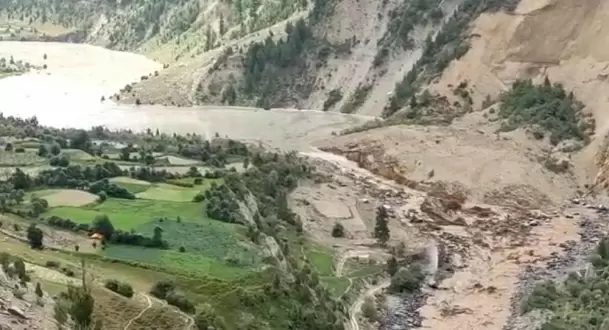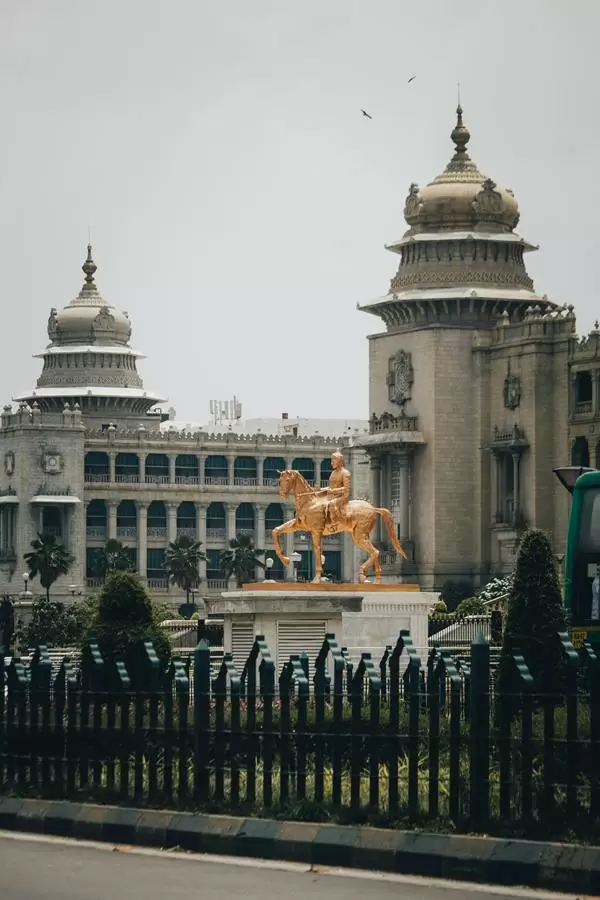Trans-Himalaya landslides in Himachal block river
Shimla
13-August-2021

Photo:IANS
A major landslide in trans-Himalayas of Himachal Pradesh on Friday blocked the flow of the glacial-fed Chandrabagha river, raising flood fears in downstream villages in Udaipur tehsil, officials said. However, the river made its natural course over the landslide after several hours of the lake formation.
"The river was blocked due to the heavy landslide in the morning. Villages were evacuated and a helicopter aerial survey and the NDRF team deployment planned," State Disaster Management Director Sudesh Kumar Mokhta told IANS here.
He said after some hours the Chandrabagha water flow has started over the landslide blockade.
"Things are under control and all downstream villages have been evacuated as a preventive measure," Mokhta added.
The dramatic pictures and videos of the river being blocked by a huge landslide in Lahaul gone viral on the social media.
The natural calamities are happening so often these days in the hill state.
Watch This TWL Video
Just two days back the devastating landslide in Kinnaur district claimed at least 15 lives and the search and rescue operations are still on.
This has been the second major natural disaster in Kinnaur in less than a month. Nine people, most of them tourists, were killed by a landslide as boulders fell and hit the vehicle they were travelling in on July 25.
Experts told IANS that since mountains in Himachal Pradesh are part of Himalayan range that are young and fragile in nature, creating cracks and fractures in the rock could widen in future and create a rockfall or slope failure zone -- a phenomenon in which a slope collapses abruptly under the influence of rainfall or an earthquake.
They say anthropological intervention along with climate change have worsened it further. Be it development of hydropower projects or tunnels or roads.
Seven people died in the exceptionally high rainfall across the cold desert of Lahaul-Spiti district on July 27-28. Keylong and Udaipur subdivision of the district faced 12 incidents of flash flood after a cloudburst in which the Tozing Nallah impact was devastating, says a government report.
Both Lahaul-Spiti and Kinnaur fall in the Himalayan ranges, known for geological and ecological vulnerability.
Explaining why flooding and landslides are common in the hill states, Y.P. Sundriyal of the Department of Geology with Hemwati Nandan Bahuguna Garhwal University in Uttarakhand, said, "Higher Himalayas, both climatically and tectonically, are highly sensitive, so much so, that at first stance the construction of mega hydro-projects should be avoided.
"Or else they should be of small capacity. Secondly, the construction of roads should be done with all scientific techniques. At present, we just see roads are being made or widened without taking proper measures such as no slope stability, lack of good quality retaining wall and rock bolting. All these measures can restrict the damage done by landslides up to some extent."
Citing a huge gap between planning and implementation, Sundriyal said for instance rainfall patterns are changing, temperatures have been increasing along with extreme weather events.
"There is no denying about the fact of development but hydropower plants, especially in higher Himalayas, should be of less capacity," he added.
Environmental activists claim the state's policy of promoting mega hydropower projects is being implemented in a fragile and eco-sensitive zone, without an appreciation of the cumulative impact of the works.
They say more than 140 hydropower projects have been allocated in the Sutlej basin and disasters like the ones in Chamoli and Kedarnath are in the making.
They demand a moratorium on the construction of all new hydropower projects located in the Sutlej and Chenab river basins until a study on the cumulative impact of the projects on the fragile ecology and livelihoods is done.
Manshi Asher of environment research and action collective group Himdhara Collective told IANS the local people have been speaking up against hydropower development for more than a decade now. And now the youth are also actively demanding a halt on these projects.
"It is high time the government listens to people's voices because the constitution grants tribals (of Lahaul-Spiti and Kinnaur) the right to say 'no' to any development that threatens their existence and survival," she said.-IANS
More Headlines
Manglam Group Invests ₹1,000 Crore in Hospitality Expansion Across Rajasthan
Chai Kings Secures ₹24 Crore Series A Funding from AVT for Expansion
Amritsar Temple Blast: One Suspect Shot Dead, Another on the Run
Chennai Police Hunt Suspects After Brutal Kotturpuram Double Murder
Haryana BJP Leader Shot Dead Over Land Dispute On Holi: Police
Manglam Group Invests ₹1,000 Crore in Hospitality Expansion Across Rajasthan
Chai Kings Secures ₹24 Crore Series A Funding from AVT for Expansion
Amritsar Temple Blast: One Suspect Shot Dead, Another on the Run
Chennai Police Hunt Suspects After Brutal Kotturpuram Double Murder
Haryana BJP Leader Shot Dead Over Land Dispute On Holi: Police










